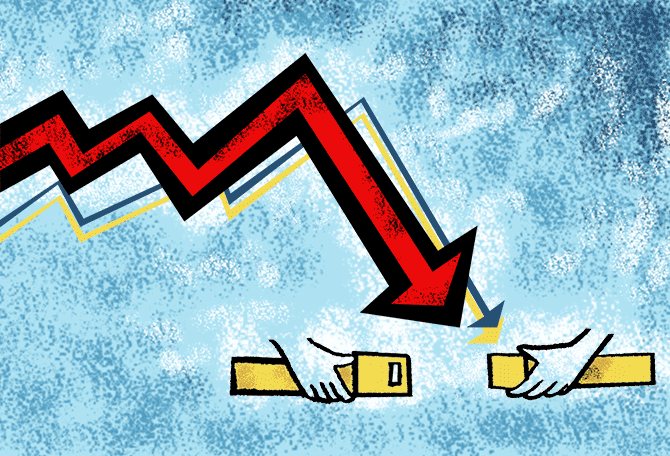Indices have hit all-time highs in the New Year and the sentiment remains strong.
All valuations are at extremely high levels, cautions Devangshu Datta.
Illustration: Dominic Xavier/Rediff.com

January is an important month in several ways.
Foreign Portfolio Investors tend to formulate their broad global strategy and projections. It's also when Q3 corporate results will start coming.
Since the Budget has been advanced to February 1, a huge number of rumours are being clustered.
In terms of consensus, FPIs seem broadly optimistic about the global economy and about an acceleration of India's growth rates.
Most are expecting moderate capital gains from the Indian stock market with appreciation of about 10 per cent for the Nifty/Sensex pair.
The Budget will be a tight balancing act, on the basis of eight or nine months worth of data. That period has seen the economy struggling to cope with GST implementation, which should stabilise over the next few quarters.
The economy has also suffered agrarian distress, which may or may not be transient.
GST tax collections and credit offsets have not yet settled into a smooth process.
Given the complexity of the system, it could take six more months or longer.
We don't yet have a clear picture of the level of net monthly tax collections, which makes it hard to estimate revenues.
As of now, revenue collections were just 48 per cent of the full-year target.
It is obvious that the fiscal situation will be under stress since central spending has exceeded the 2017-2018 assumptions.
The fiscal deficit is bound to exceed targets as expected, but we don't know by how much.
The next fiscal (2018-2019) will be driven by electoral considerations so it would be unrealistic to expect the government to cut back expenditure on the social front.
Investors will be interested in knowing the targeted fiscal deficit for 2018-2019.
Will the Budget cut corporate tax rates?
A lot of optimists are expecting this, but a high fisc could dissuade the finance minister. Pessimists are gloomily predicting that a tax may be imposed on long-term capital gains.
The advance GDP estimates for 2017-2018 may be an under-estimate and the market is assuming it is.
On the basis of eight months, real GDP growth for the year is being estimated at around 6.5 per cent.
The first half was poor, but there are signs that economic growth has started picking up and the second half could be stronger than the assumed growth rate of 7 per cent.
Manufacturing and services have both shown a pickup in December, going by the PMI. Core sector growth has improved considerably.
Given a low base effect, manufacturing and services might surprise on the upside.
There are some signs that corporate investment is improving, but there are also signs that consumption is slowing down.
Agriculture is the sore spot with very low growth.
Agriculture is likely to continue lagging through the second half since crop-acreage is lower than last year.
Net-net, it isn't obvious that the informal economy has fully recovered yet from demonetisation and GST put more pressure on sectors with a large informal component in the value chain.
Agriculture lagging could mean farm loan waivers, an expanded MNREGA budget, higher minimum support prices, free or highly subsidised power, etc.
The Gujarat state assembly elections highlighted the impact that rural distress has on voter sentiment -- the incumbent BJP did quite badly in rural areas.
Alleviation of rural distress could mean an expansion of the fisc but it could also put money into people's hands and boost consumption.
Another area of pain could be inflation.
Food prices could spike if there's a low rabi harvest.
The Iran protests have led to a spike in crude prices. Even if that quietens down without supply disruptions, crude prices are expected to stay in a higher band because of OPEC curtailing production.
Although India's inflation indices appear well under control, governments tend to be abnormally sensitive to inflation going into electoral battles.
Globally speaking, the First World economies are doing fine.
The USA is chugging along.
The Eurozone is enjoying its best year in over a decade while Japan enjoyed its best year in two decades.
The weak link is the United Kingdom which is expected to continue seeing Brexit-related turmoil.
Italy's election in March could also cause some confusion in what is now the EU's third-largest economy.
Interestingly, the US dollar has lost a lot of ground against other currencies despite the Federal Reserve having pushed up policy rates and signalled that it will do so again. Everyone expects the European Central Bank and the Bank of Japan to tighten liquidity and raise rates.
The ECB has cut the quantum of its ongoing quantitative easing programme from January but the prospect of reduced liquidity doesn't have to made an impact yet.
The Iran situation affected sentiment in the crude market.
Another area of concern is North Korea's missile testing. Both North Korea's head of State and US President Donald J Trump have made public references to the nuclear button. This is a 'black swan' situation.
2017 was an incredibly good year for equity investors with excellent returns from almost every region.
MSCI's world equity index, which tracks shares in 47 countries, has returned more than 24 percent this year including dividends.
Commodities, including industrial metals like copper, have trended up strongly. Of course, nothing beat cryptocurrency, despite big selloffs in the last week of December.
Technically speaking, the Indian indices have hit new all-time highs in the New Year and the sentiment remains strong.
All valuations are also at extremely high levels, which is a situation when prudent investors stay braced for sudden corrections.












 © 2025
© 2025